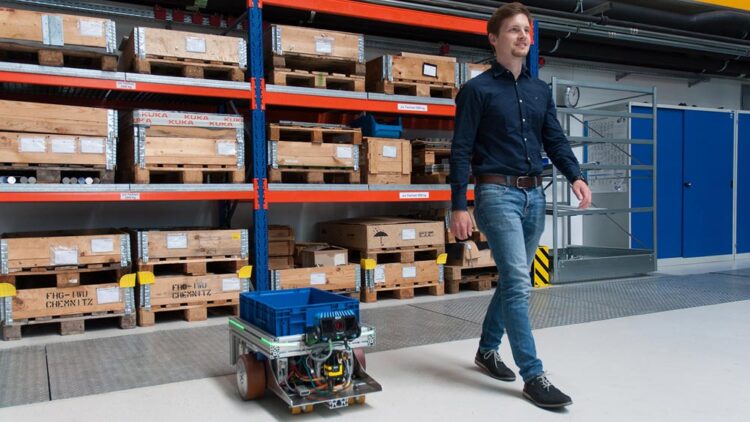Driverless Transport System wins 3Dsensation Innovation Award

Ausgezeichnetes Projekt "FollowMe": Christoph Allmacher, Wissenschaftler an der Professur Produktionssysteme und -prozesse der TU Chemnitz, testet sein neu entwickeltes fahrerloses Transportfahrzeug.
René Apitzsch / TU Chemnitz
The Professorship of Production Systems and Processes at Chemnitz University of Technology receives award for project on safe human-robot cooperation in the warehouse.
The Professorship of Production Systems and Processes (Prof. Dr. Martin Dix (German)) at Chemnitz University of Technology received the “3Dsensation Innovation Award” in the community award category for its FOLLOWme project on safe human-robot cooperation in the warehouse. At the same time, a second project within the 3Dsensation innovation alliance received the jury prize.
The 3Dsensation Innovation Prize was awarded by Prof. Dr. Andreas Tünnermann, spokesman of the 3Dsensation steering committee at the Fraunhofer Institute for Applied Optics and Precision Engineering IOF during an online event on 10 November 2020. Christoph Allmacher, scientist at the Professorship of Production Systems and Processes at Chemnitz University of Technology, accepted the award. The Innovation Alliance aims to advance the interaction of man and machine through interdisciplinary research and development work. The Federal Ministry of Education and Research (BMBF) is funding the research alliance with a total of 45 million euros.
Coordination in the expert community – a promising field of research
After a vote in the 3Dsensation research alliance community, the prize was awarded to the Chemnitz scientists and their project partners on 19 November 2020 during the general meeting. Due to Corona, the award-winning projects received their prizes including sparkling wine to toast by mail. The prize includes the professional production of an image film on the research topic as well as marketing support worth 8,000 euros. This is intended to promote the transfer of the research results into practice.
“I congratulate all the researchers very warmly on this fantastic recognition from their colleagues,” says Prof. Martin Dix, Head of the Professorship of Production Systems and Processes and Institute Director at the Fraunhofer Institute for Machine Tools and Forming Technology IWU. “Mr. Allmacher and his colleagues have implemented great innovations here, which is another step forward in the cooperation between man and machine. We must and will continue to expand this field of research in the coming years, as this is the decisive factor for efficient and flexible production.”
Megatrend of autonomous machines
Autonomous driverless transport systems for intralogistics are a megatrend on which the researchers of the Professorship of Production Systems and Processes have been working since March 2016. Their vision is of intelligent, driverless transport vehicles that will increase efficiency in intralogistics. For example, the vehicles follow an order picker independently through the warehouse while packing. They use 3D cameras and laser scanners to navigate through the aisles, avoid obstacles, and brake when an employee crosses their path.
The FOLLOWme project, which was funded by the Federal Ministry of Education and Research with around 1.5 million euros, was completed in 2019. Since then, the project results have been presented in scientific publications, the media, and at events. “The topic has met with a great response, which is why further research projects and my dissertation on the virtual commissioning of driverless transport vehicles are in progress,” reveals Christoph Allmacher, a scientist at the Professorship of Production Systems and Processes. “Next, we want to extend the driverless transport system by augmented reality gesture interaction, and of course we are looking forward to industrial partners who will implement our vision and our proven results.”
Background: Innovation Alliance 3Dsensation
The Innovation Alliance 3Dsensation aims to fundamentally change the interaction between man and machine. The focus is on the interdisciplinary combination of competences in optics/photonics, IT/software engineering, and electronics with competences in the fields of design, neuro-, cognitive, and occupational sciences.
Currently 20 research institutes are participating in the initial 3Dsensation consortium. The innovation alliance for a novel human-machine interaction cooperates with companies from industry and can draw on various networks of the partners. The research alliance is funded by the BMBF. In addition to large as well as small and medium-sized companies and research institutes belong to the alliance.
Background: 3Dsensations Innovation Award
The 3Dsensations Innovation Award was awarded for the first and only time at the end of the Innovation Alliance. All projects were eligible; five projects applied. The jury selected two. A community prize and a jury prize were awarded equally. The project FOLLOWme was awarded the community prize.
Wissenschaftliche Ansprechpartner:
Christoph Allmacher, Wissenschaftler an der Professur Produktionssysteme und -prozesse der TU Chemnitz, Tel. +49 (0)371-531-32036, E-Mail christoph.allmacher@mb.tu-chemnitz.de
Weitere Informationen:
Media Contact
All latest news from the category: Awards Funding
Newest articles

New model of neuronal circuit provides insight on eye movement
Working with week-old zebrafish larva, researchers at Weill Cornell Medicine and colleagues decoded how the connections formed by a network of neurons in the brainstem guide the fishes’ gaze. The…

Innovative protocol maps NMDA receptors in Alzheimer’s-Affected brains
Researchers from the Institute for Neurosciences (IN), a joint center of the Miguel Hernández University of Elche (UMH) and the Spanish National Research Council (CSIC), who are also part of…

New insights into sleep
…uncover key mechanisms related to cognitive function. Discovery suggests broad implications for giving brain a boost. While it’s well known that sleep enhances cognitive performance, the underlying neural mechanisms, particularly…



